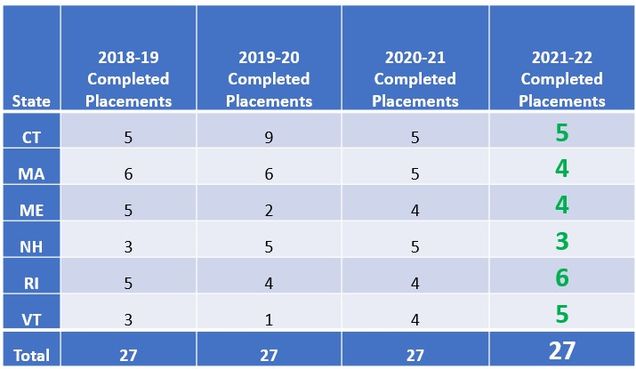27 Students Across New England Receive Stipends for Public Health Work in Underserved Communities
27 students, distributed across New England, completed field placements and received stipends from HRSA for working in agencies to serve underserved communities, while building competency as part of the future public health workforce.
“We worked really hard each year on distributing placements evenly across New England,” says Maurine Crouch, Manager of Field Placements for NEPHTC, who works at Yale School of Public Health. “Given the particular challenges of recent years, agencies and partners have varying capacities to host students in their organizations.”
Students completed a wide range of projects from assessing school-based oral health services to ensuring healthy food access to all. A complete list of the outstanding projects can be found on the Student Field Placement page for Fiscal Year 2022 here. To highlight a few projects, here is one project from each state:
- Connecticut: Senyte Pierce’s project with Health Equity Solutions to improve and increase community engagement
- Maine: Aisling McEleney’s project with Partners for World Health to redistribute unused medical equipment from local medical centers to communities in need
- Massachusetts: Deanna Sarsour’s project with East Boston Neighborhood Health Center to culturally competent educational materials for patients
- New Hampshire: Haley Wood’s project with Meals 4 Kids (M4K) to assess the efficacy of M4K’s ability to provide free and fresh foods to children in underserved communities
- Rhode Island: Claire Hodges’ project with the Rhode Island Public Health Institute to create graphics aimed at improving health literacy
- Vermont: Abigail DeBay’s project with Cathedral Square Assisted Living to plan a Social Connectedness Program for seniors
“Programs and sch ools of public health also have different student populations in different geographies. NEPHTC partners tell us that many of their part time students or online students don’t have the time to pick up a placement easily, as they are often working other jobs to pay for school. For this reason, we try to remain flexible for students who can arrange placements that can meet their situation,” Crouch observes.
ools of public health also have different student populations in different geographies. NEPHTC partners tell us that many of their part time students or online students don’t have the time to pick up a placement easily, as they are often working other jobs to pay for school. For this reason, we try to remain flexible for students who can arrange placements that can meet their situation,” Crouch observes.
“NEPHTC implemented some new marketing and data collection to increase applications for stipends and to learn more about students’ diverse backgrounds and situations. We continue to do Quality Improvement in our health equity stipend program,” says Karla Todd Barrett, Senior Program Manager for NEPHTC.